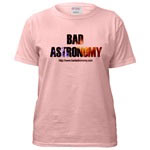
| Bad Astronomy |
|
|
|
BA Blog
|
|
Q & BA
|
|
Bulletin Board
|
| Media |
|
|
|
Bitesize Astronomy
|
|
Bad Astro Store
|
|
Mad Science
|
|
Fun Stuff
|
| Site Info |
|
|
|
Links
|
| RELATED SITES |
| - Universe Today |
| - APOD |
| - The Nine Planets |
| - Mystery Investigators |
| - Slacker Astronomy |
| - Skepticality |
Buy My Stuff

Keep Bad Astronomy close to your heart, and help make me
filthy rich. Hey, it's either this or one of those really
irritating PayPal donation buttons here.
When you are in space, besides our sun, can we see other stars?
Date: Sun Oct 12 11:55:50 1997Posted by Eric Duplessis
Grade level: 4-6
School: L'Odyssée
City: Orleans (Ottawa) State/Province: ON
Country: CA
Area of science: Astronomy
ID: 876675350.As
Message:
When you are in space, besides our Sun, can we see other stars?
Certainly! As a matter of fact, you can see more stars from space than you can from the ground. Have you noticed that stars are not steady points of light, but instead twinkle and flicker? That's because the Earth's atmosphere distorts the light coming in from the stars, like the way you see the air shimmer off a hot road in the summer. As air above your head blows around, it acts like millions of tiny lenses, bending the light from the stars in all different directions. This is what makes the stars look like they dance. This makes really faint stars hard to see, because it's hard for your eye to get enough light from faint stars to see them. Not only that, but the Earth's atmosphere is not perfectly transparent, so some light gets blocked on its way down, making stars look even fainter.
But in space, there is no air! Astronauts have reported being surprised at how steady and clear the stars look. Although I have heard different stories from different people, I think that astronauts can see a few more stars on average than we can here on Earth, but not a huge amount more. Remember, they still have to look through a window (whether they are on a rocket or in a space suit)! Try this: on a clear night, try to count how many stars you can see through your bedroom window. Then go outside and look at the same spot, and see if you can count more stars. You probably will!
One more thing: you have probably heard of the Hubble Space Telescope. It surprises many people to learn that Hubble is not the biggest telescope in the world. As a matter of fact, it's actually kind of small as telescopes go! Hubble's biggest advantage is that it is in orbit high above the atmosphere, so the distorting effects of the Earth's air aren't a problem. This gives it a huge advantage over ground-based telescopes.
If you want to learn more about stars and Hubble, I have a few web pages you can look at: my Bitesized Astronomy pages have some fun ideas about Hubble, and I have lots of links to other astronomical web pages on my Good Science links page.
|
|
MADSCI Q&A
Q&A 1996
Q&A 1997
Q&A 1998
Q&A 1999
Q&A 2000
| Subscribe to the Bad Astronomy Newsletter! |
| Talk about Bad Astronomy on the BA Bulletin Board! |